Dalila Bennett and Casey Mazar-Kelly are no strangers to a crowded field.
Fire Cat Farm, their four-year-old flower and vegetable operation, occupies just one-half acre on the grounds of Island Grown Initiative (IGI) in the center of the Island. A relative spit of land by Island farming standards, it features a greenhouse with ranunculus and eucalyptus, as well as fields packed with various flowers, crops, and herbs.
On any given day, you might find the team of farmers there, lending one another a hand with weeding, seeding, or harvesting. Then again, if it’s a Saturday or Wednesday morning from spring to fall, you’ll likely find them at the West Tisbury Farmers’ Market, where they’ve made a name for themselves and found success despite much stiff competition in the flower-farming sector. Not that Bennett and Mazar-Kelly, who both use they/them pronouns, view their fellow flower farmers as competitors.
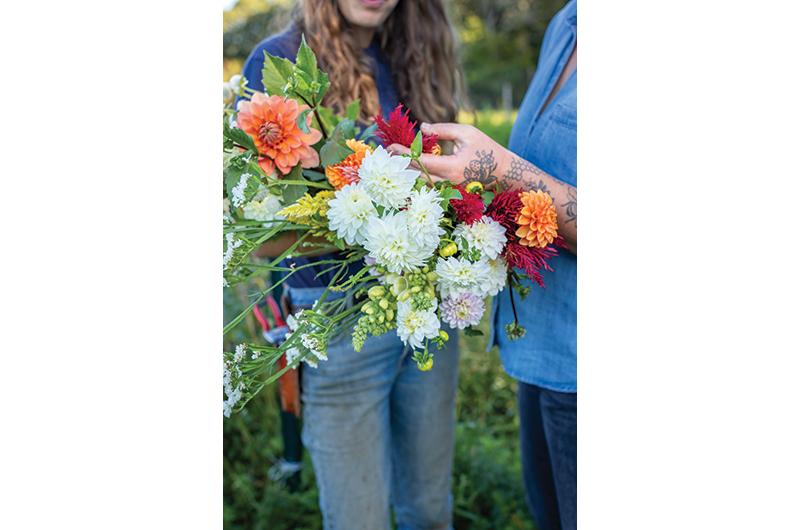
“There’s a lot of flower vendors, but each one of us does something different,” said Bennett. “When people come to market, they get to shop around and they’re able to get what they want. It’s really awesome for all of us.”
“It’s so cool seeing the person who has their hands full of flowers from every single stand!” concurred Mazar-Kelly. “Customers will be like, ‘Well, maybe I’ll get some flowers for my bedroom too! Maybe I’ll buy that celosia and add it to my bouquet.’ We try to collaborate as much as possible. Rising tides will bring us all up.”
It’s this ethos of community and collaboration that defines almost every aspect of the farm, including its name, which was inspired by the 1972 children’s book Teaser and the Firecat. In the beloved tale, written by musician Cat Stevens, the moon falls from the sky and becomes stuck in an old, deserted barn. The protagonists embark on one adventure after another in an attempt to retrieve the moon. And yet success evades them until they enlist the help of five wise owls who fling the moon back into orbit.
That same ethos is evident in the origin story of the farm, which extends beyond its relatively short history to when Bennett, who was born and raised on the Vineyard, met Mazar-Kelly, who began spending summers here at age six.
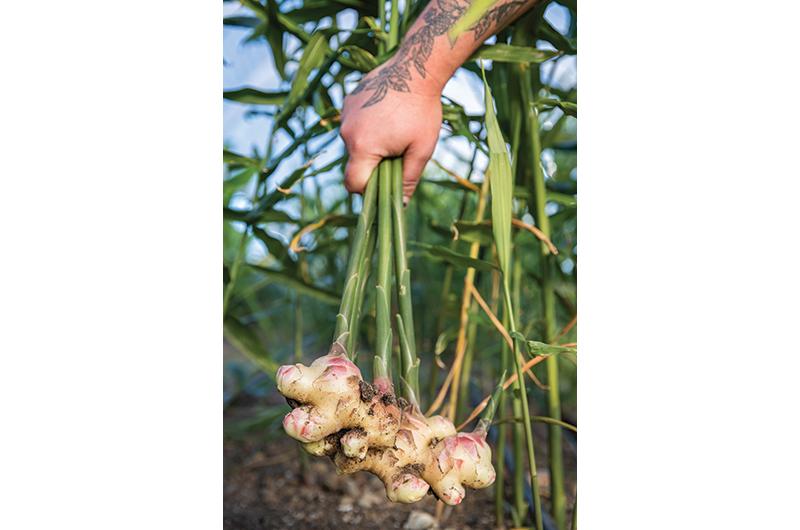
“Dalila was my point-one Island friend that I knew when I’d come here each summer,” Mazar-Kelly recalled earlier this spring. “We’d have so much fun running around and going to the beach and just being goofy together.”
Bennett eventually moved off-Island during middle school and the two fell out of touch. They later reconnected while working at Morning Glory Farm in Edgartown. At that time, Bennett was heavily invested in the flower side of Morning Glory’s operations: following a brief stint on the field crew, they joined the flower crew, then served as manager and a Community Supported Agriculture (CSA) florist for several years, which saw them overseeing four acres of flowers. Mazar-Kelly, meanwhile, tackled the likes of herb management and wholesale, and also helped initiate Morning Glory’s CSA program.
At the end of summer, the two would go their separate ways to pursue their individual studies – Bennett studied sculpture, printmaking, and art history at Boston University, then spent a summer studying marble carving in Vermont. Mazar-Kelly attended the University of New Hampshire, where they earned a dual degree in sustainable agriculture/food systems and ecogastronomy – the art and appreciation of food combined with the myriad social, economic, political, and ethical issues associated with food production and eating.
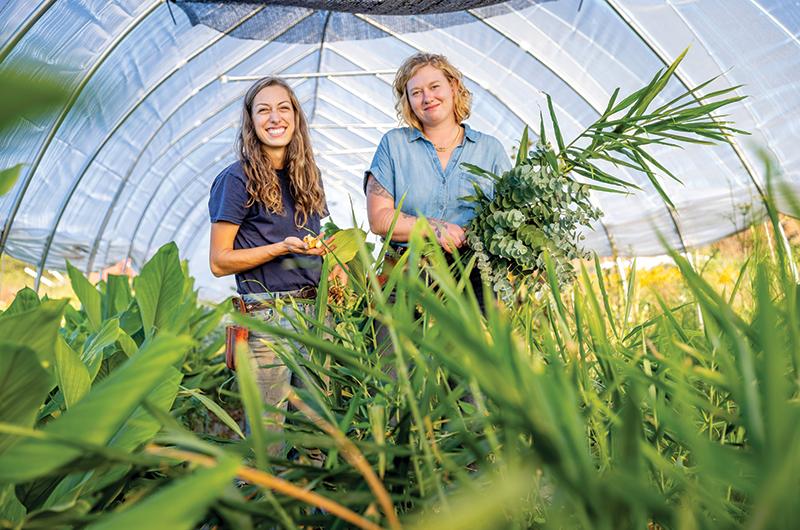
Both intended to eventually leave farming behind, but found they were drawn to it again and again. They also found a way to incorporate their own particular interests into the field. While in school, many of Mazar-Kelly’s undergrad projects centered around Martha’s Vineyard as a case study. The experience, Mazar-Kelly said, served as a catalyst for their interest in vegetable growing, particularly with an eye toward contributing to the “intricate and impressive food system” on the Island.
Bennett, meanwhile, brought lessons from sculpture and carving into their flower-arranging work. “I’m creating something structural and colorful. There’s no way around it, really,” they noted. “It pretty much is my art practice at this point.”
As the two transitioned from childhood to adult friendship, they gained a deeper appreciation for each other’s respective projects and work ethics. They also began to outline a dream. “We really got to know each other under different contexts,” Mazar-Kelly reflected. “It kind of felt like when you’re kids and you’re saying, ‘What if we had a farm together? We’re gonna do it all!’”
Plenty of friends tried to discourage them, to tell them that it was, in fact, a childish dream and remind them of the sometimes brutal, burnout-inducing nature of farming. “For a long time I had a lot of people telling me I can’t just keep farming for the rest of my life,” said Bennett. But faced with those concerns, they remained undeterred.
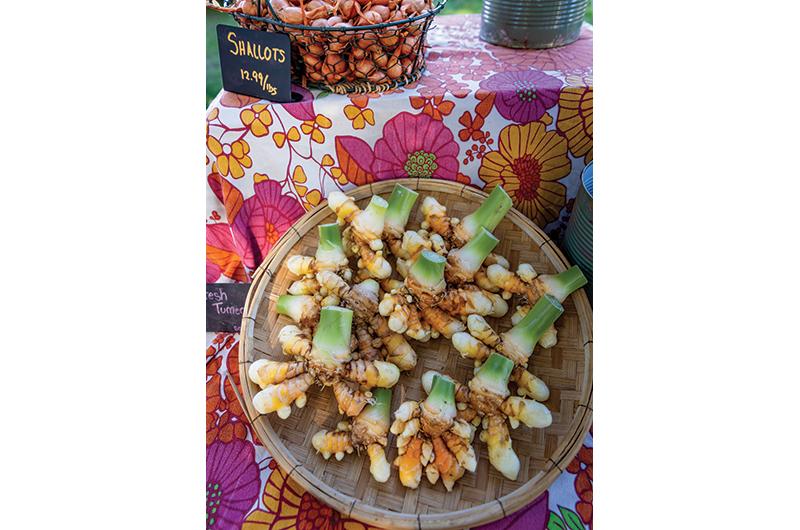
“I finally just said... ‘No,’” Bennett said plainly with a laugh. “I don’t need to feel the pressure from all these people telling me not to do something that I love and that I keep coming back to. I finally accepted that. I just wanted to be able to create something that was a bit more unique.”
In 2020, they got their chance. That year, an acquaintance informed Bennett that a plot of land, complete with a greenhouse, was available at IGI. “I jumped on the idea,” Bennett said.
That first year was a busy one. Bennett, who was holding down a full-time job as a solar installer for South Mountain Company, readied the greenhouse and planted a selection of flowers. They also joined the West Tisbury Farmers’ Market, sharing a booth with The Garden Farm, a small operation run by Bennett’s then–romantic partner Lydia Fischer.
By the summer of 2022, Mazar-Kelly began assisting with operations. It was a “serendipitous” moment, Mazar-Kelly said. At the time, they were navigating their own next career move when Bennett approached them about joining the farm as a business partner.
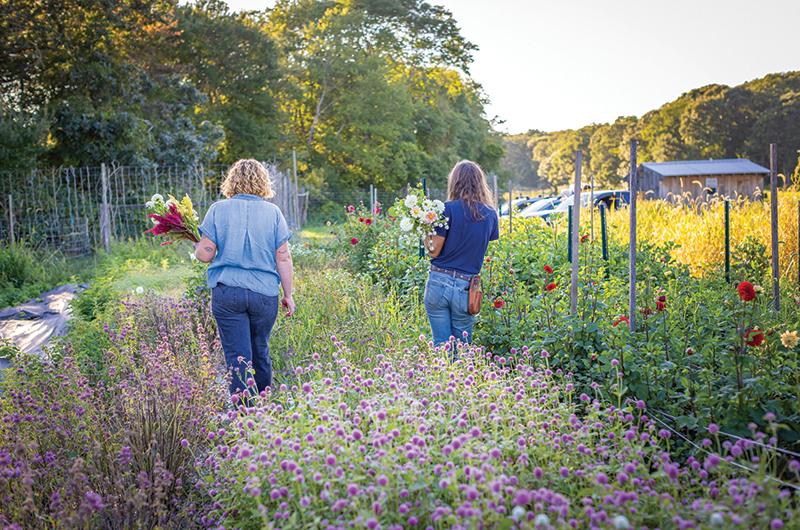
“Dalila and I align so much in our ethos behind why we want to be farming,” said Mazar-Kelly. “We’re trying to have a low impact on the environment, protect pollinators, support our community, and be as inclusive as possible.”
They were also trying to work their way into an already booming industry – at last count, the West Tisbury Farmers’ Market has at least fourteen vendors selling flowers. The Fire Cat team sought to make their mark by offering unique color choices and fun names of bouquets, such as “Strawberry Milkshake,” as well as offering a select choice of pesticide-free crops, such as lemongrass, turmeric, and ginger, that are not often locally grown. Most of all, they wanted to do so while continuing to support and uplift those in their community and industry.
Through hard work and perseverance – their full-time jobs are now the farm and its operation – they’ve achieved their goals. In 2022, Fire Cat Farm became officially incorporated with Bennett and Mazar-Kelly as co-owners. That same year they obtained their own booth at the West Tisbury Farmers’ Market, where they sell their flowers and vegetables. They’ve since also joined the Edgartown Village Market, where they sell flowers. More recently, they partnered with IGI to create a flower farm CSA.
“It’s been really cool over the past couple of years just seeing who comes to the table. How happy they are to see everything,” Bennett said with a shrug, then gestured to their friend and business partner. “And how happy they are to see Casey’s face!”
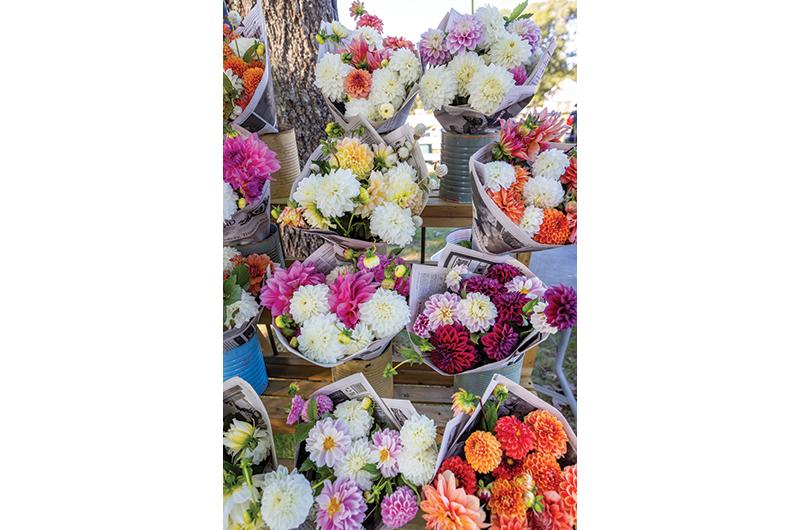
While happy faces are their own reward, the pair also take pride in breaking into the wedding industry, and even turning the process on its head. Last year a couple stopped by the West Tisbury Farmers’ Market with their kids and picked out six bouquets for their elopement the following day. “I think that’s a really cool moment where everyone picked out which bouquet spoke to them,” Mazar-Kelly recalled. “They didn’t need to order in advance, just come to the market and pick them up. We want to be able to create beautiful events, be able to be affordable, and do something that isn’t quite as daunting for people.”
The farm has also begun offering a DIY bucket option through its website: those looking for blooms for smaller events can buy harvested flowers and receive a build-your-own bouquet kit. “It’s so fun for the people who get the buckets. They get to have their creative fun with it,” Bennett raved. Depending on the time of year, those buckets can include any number of the twenty-three varieties of dahlias that Fire Cat grows.
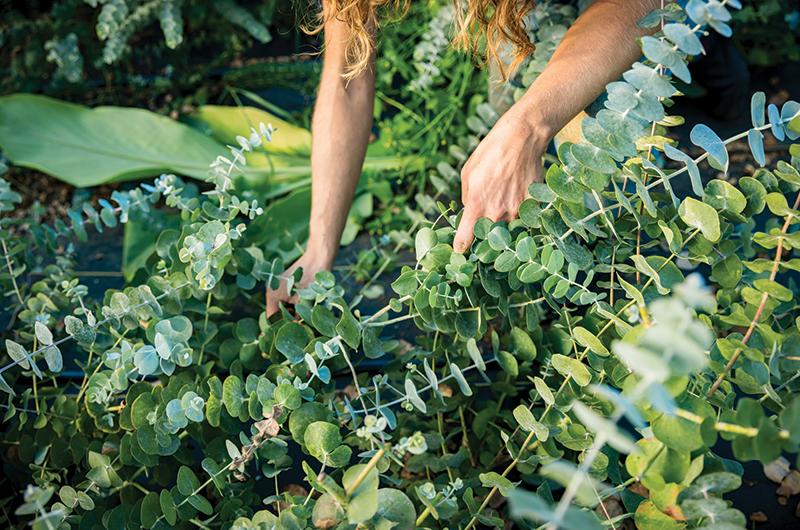
Of course, for couples looking for a little more structure with their wedding-day blooms, Fire Cat can create bouquets, centerpieces, and arbor arrangements. Now entering its fourth growing season, the farm’s schedule has been steadily filling up with wedding bookings. With the goal of keeping it local and buying as little as possible from off-Island wholesalers, the team consults other Vineyard flower farms if its own fields are lacking in specific varieties. Plus, Bennett described the joy of another frequent option: foraging for fun grasses and plants. Not only does foraging “add local flair” to the bouquets, it’s a playful method of reducing invasive populations.
If they have a wedding outside of their scope of capabilities, Fire Cat will pass it along to one of the other Vineyard florists. “Since we’re able to work so closely with them, it doesn’t feel as competitive. It feels like supporting another business that we want to do well, which is still supporting us in the long run,” Mazar-Kelly noted. “We try to collaborate as much as possible.”
That, after all, has been key to their hard-earned success. The hectic pace of harvesting and keeping up with their seeding schedule during peak season reminds them to support one another and recruit help when necessary. As part of a team that is “very prone to overworking [them]selves,” Bennett attributed their staying power – and, perhaps, sanity – to doing so. Namely, they give thanks to their respective “very patient partners,” assistance from IGI’s team in the event of storm damage, and those in their personal circles willing to take on extra tasks.
“We have so many friends who have farming and floral backgrounds who want to come help. We even have friends from off-Island who are like, ‘Can I come visit you and farm for a day? Can I do a farmers’ market?’” Bennett said.
“We have a lot of people who are cheering us on right now and that makes it feel that much sweeter,” Mazar-Kelly agreed. “This farm does feel like a fruition of a long-term dream. So many pieces of both of our lives have kind of fit together to lead us to this spot.”
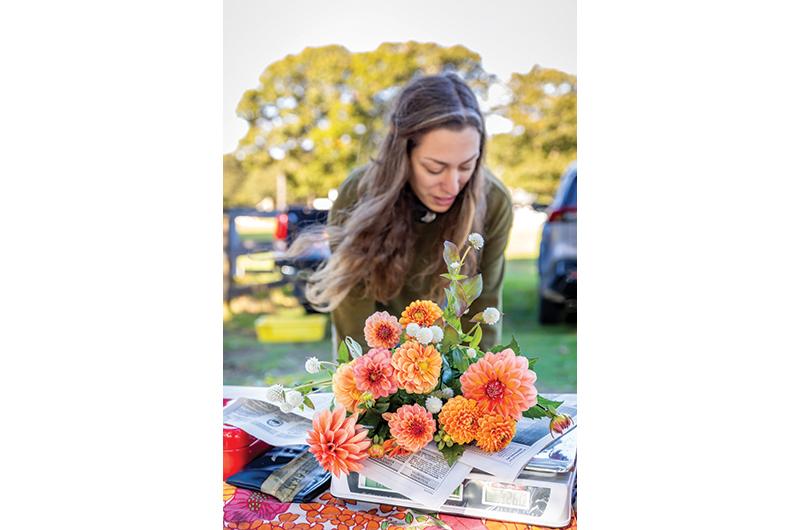
And yet for all the thanks they give to others, and their nods to the “it-takes-a-village” mentality, at the end of the day their success does come down to two people putting in the work and making it work.
“It feels really good being like, ‘This is just us!’” Mazar-Kelly admitted. “We had a lot of people supporting us and helping us get here. But our four hands did a lot of work to make this happen.”
“This is our, um…mess,” said Bennett, gesturing to a thriving plot of flowers.

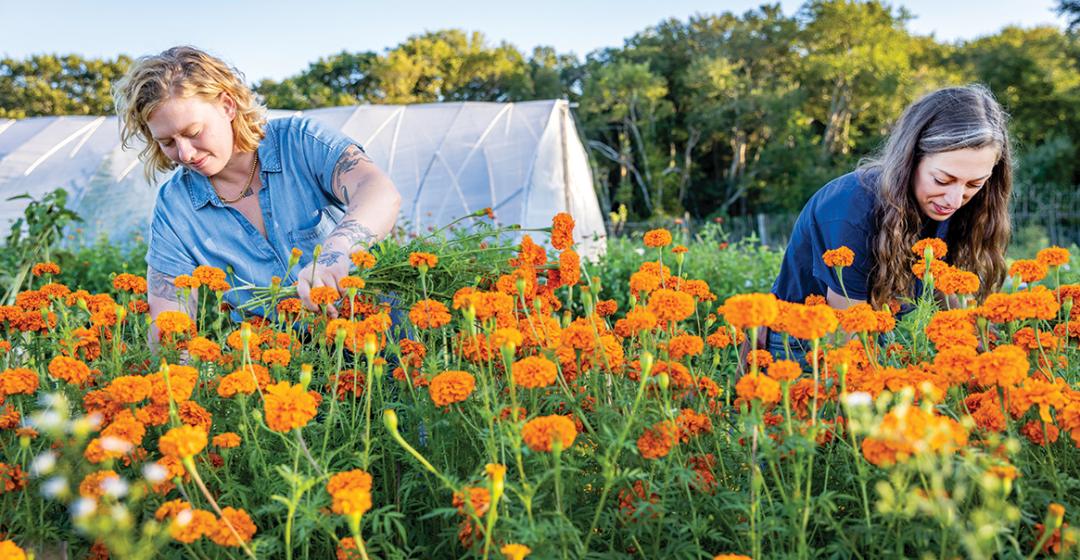


 1 comment
1 comment
Comments (1)